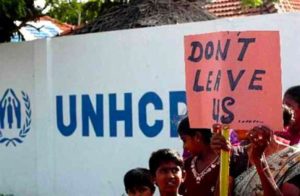 Since the 1970s, International Humanitarian and Development Organisations (IHDO) have increasingly become part of the global network of aid actors implementing programmes in Sri Lanka. The strategic and prominent roles of the host government and other local organisations, whilst acknowledged as imperative, have sometimes been sidelined, or loose asymetric ‘partnerships’ formed to offer the impression of ‘local ownership’.
Since the 1970s, International Humanitarian and Development Organisations (IHDO) have increasingly become part of the global network of aid actors implementing programmes in Sri Lanka. The strategic and prominent roles of the host government and other local organisations, whilst acknowledged as imperative, have sometimes been sidelined, or loose asymetric ‘partnerships’ formed to offer the impression of ‘local ownership’.
IHDO programmes (emergency relief through rehabilitation towards longer-term development), are based on the provision of donor financing. These sometimes perpetual funding cycles unquestionably provide assistance to a vulnerable and needy population that has suffered from a 26-year internal armed conflict, terrible human rights violations, and numerous natural disasters including the tsunami of 2004. However, they simultaneously and decidedly support the prolonged residence and subsistance of IHDO’s in Sri Lanka.
Additionally, whilst IHDO’s Sri Lankan staff are empowered with knowledge and experience, there is further potential for them taking on new roles that enable IHDO’s withdrawal and enhance the sustainability of these externally-driven interventions.
It is generally accepted that IHDO withdrawal and leaving sustainable mechanisms and structures in place, are overarching objectives of international aid. Yet at institutional and personnel levels in Sri Lanka, IHDO’s may not be adequately considering nor implementing effective disengagement, leading to [local] dependence longer term.
This research report explores and challenges this situation, proposing alternative measures and recommendations for more effective IHDO disengagement strategies in and from Sri Lanka.
To download the full document click here
